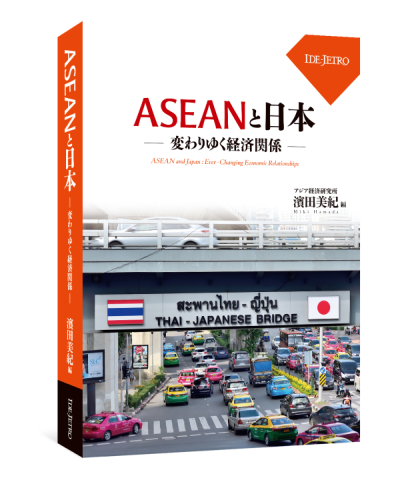Japanese eBooks
eBook

ASEAN and Japan: Ever-Changing Economic Relationships
Download eBook for free
Available in EPUB and PDF format for full book. EPUB files can be opened in eBook readers.
Buy the print-on-demand book
About this book
About this book
The purpose of this publication is to understand the development of the ASEAN–Japan relationship on the occasion of the 50th anniversary of ASEAN–Japan Friendship and Cooperation in 2023. This book provides an overview of Japan’s changing relationship with the ASEAN region and presents statistical analyses of trade, investment, and aid while considering the following two perspectives. The first perspective is that of the individual ASEAN countries regarding their relationship with Japan, taking into account diversity in stages of economic development and other factors. The second perspective is that of ASEAN as a whole regarding its relationship with Japan as an economic cooperation organization and the role of the ASEAN economy in a globalizing world economy.
Contents
Preface
Introduction – Thinking about Growing Together with ASEAN
Author:Miki HAMADA
Chapter 1. The Indonesia–Japan Economic Relationship: From Aid to Investment, from Investment to Sharing Strategies
Author:Miki HAMADA
Chapter 2. The Malaysia–Japan Economic Relationship: Toward Reciprocity for High-Income Countries
Author:Satoru KUMAGAI
Chapter 3 The Philippines–Japan Economic Relationship: Supporting Development and Sharing Growth Opportunities
Author:Yurika SUZUKI
Chapter 4. The Singapore–Japan Economic Relationship and its Transformation
Author:Ryoichi HISASUE
Chapter 5. The Thai Economy and Japan: Will the Clustering of Japanese Companies Continue?
Author:Kazunari TSUKADA
Chapter 6. The Vietnamese Economy and Japan: Time to Adapt to New Challenges and Changes
Author:Mai FUJITA
Chapter 7. Evolvement of Japan’s Economic Cooperation with Laos: Challenges in Moving Beyond Grants
Author:Souknilanh KEOLA
Chapter 8. Foreign Aid and Direct Investment in Cambodia: The Rise of China and Diversification of Partners
Author:Mai FUJITA
Chapter 9. Japan’s Official Development Assistance to Myanmar: Logic of Expansion and Freezing
Author:Toshihiro KUDO
Chapter 10. Fifty Years of Japan–ASEAN Economic Cooperation
Author:So UMEZAKI
Chapter 11. Trade and Investment Relations between ASEAN and Japan: A Global Value Chain Perspective
Author:Bo MENG and Wenyin CHENG
Chapter 12. Calculating the Economic Impacts of Japan’s Infrastructure Development Assistance: Analyzing Economic Corridors with IDE-GSM
Author:Satoru KUMAGAI and Souknilanh KEOLA
Reference Materials – A Statistical Perspective on ASEAN
Author:Yang ZHOU
Preface
Preface
The year 2023 marked a milestone 50 years of ASEAN–Japan Friendship and Cooperation. During that time, both Japan and the Association of Southeast Asian Nation (ASEAN) have undergone substantial changes. Japan experienced a period of rapid economic growth, followed by the bursting of the bubble economy and the “lost decades.” Meanwhile, the five countries that formed ASEAN for postwar reconstruction purposes underwent structural adjustments in the 1980s and achieved rapid economic growth in the 1990s, which is often referred to as the “Asian Miracle.” Despite the significant economic turmoil caused by the Asian financial crisis in the late 1990s, these nations managed to continue their economic reconstruction. The four less developed countries in the region stabilized their domestic affairs by the mid-1990s, leading to their accession to ASEAN and expanding the ASEAN membership to 10 countries. Embracing and reaping the benefits of the globalization of the world economy, ASEAN has continued to thrive as one of the most dynamic growth centers of the world.
Japan, through official development assistance that commenced with post-war reparations, has not only fostered the economic growth of ASEAN countries but also achieved its own economic growth by incorporating these developments. Over these 50 years, Japan and ASEAN countries have walked together, not just as aid donor/recipients but also as significant trade and investment partners. In commemoration of these 50 years of Friendship and Cooperation, 2023 served as an opportunity for Japan to contemplate its relations with ASEAN. In June 2023, the Institute of Developing Economies (IDE) held an international symposium online, and in August, the Japanese economic circle, which includes the Ministry of Economy, Trade and Industry (METI), the Japan External Trade Organization (JETRO), and the Japan Chamber of Commerce and Industry (JCCI), compiled the “Japan–ASEAN Economic Co-creation Vision“, which aims to develop a new generation of ASEAN-Japan economic partnership, building on the bond of trust between ASEAN and Japan.
IDE, which has a large number of researchers observing ASEAN countries, took the milestone as an opportunity to launch the research project “Changing ASEAN–Japan Economic Relations: Past and Future” in April 2023 to examine the evolution of ASEAN–Japan relations. The objective of this research project was to analyze, based on statistics related to trade, investment, and aid, the long-held assertion that Japan’s position vis-à-vis ASEAN is in decline, from an ASEAN perspective. Considering the diversity of economic development stages and political systems across the 10 ASEAN member countries, individual analyses were performed to grasp the diversity and various relationships between ASEAN countries and Japan. Moreover, the project also attempted to provide an overview of the relationship between ASEAN as a whole and Japan, focusing, for example, on the role of ASEAN as an economic cooperation organization and the integration of the ASEAN economy into the global economy. This book summarizes the research findings. By objectively confirming the change in Japan’s position through statistical analyses, we hope to provide readers with an opportunity to re-evaluate Japan from the ASEAN perspective.
The contributors to this book have consistently observed ASEAN countries in their daily research, which enabled the completion of numerous chapters in a short period. I am grateful to the two reviewers and to Dr. Sanae Suzuki (University of Tokyo) and Dr. Hiroshi Yamada (Niigata University of International and Information Studies) for their valuable advice. I wish to express my sincere gratitude to everyone involved at IDE for their great efforts in editing and publishing this book, including managing the research project and editing numerous figures and tables.
Lastly, it is important to note that the opinions presented in each chapter of this book belong to the individual authors and do not necessarily represent the views of the research project or the organizations to which they belong.
March 2024
Editor


